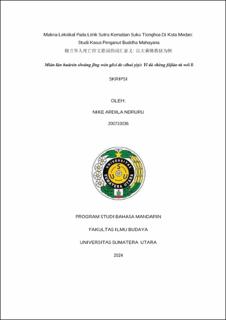Makna Leksikal pada Lirik Sutra Kematian Suku Tionghoa di Kota Medan: Studi Kasus Penganut Buddha Mahayana 棉兰华人死亡经文歌词的词汇意义: 以大乘佛教徒为例 Mián lán huárén sǐwáng jīng wén gēcí de cíhuì yìyì: Yǐ dà shèng fójiào tú wéi lì
Lexical Meaning of the Death Sutra Lyrics of the Chinese Tribe in Medan City: A Case Study of Mahayana Buddhists 棉兰华人死亡经文歌词的词汇意义: 以大乘佛教徒为例 Mián lán huárén sǐwáng jīng wén gēcí de cíhuì yìyì: Yǐ dà shèng fójiào tú wéi lì

Date
2024Author
Ndruru, Nike Ardila
Advisor(s)
Adha, T Kasa Rullah
Jessy
Metadata
Show full item recordAbstract
The death sutras of the Chinese in Medan are very rich in lexical meaning. This study aims to describe the lexical meaning contained in the lyrics of the death sutras of the Chinese in Medan. This study uses the theory of Systemic Functional Linguistic Theory (TLSF) proposed by Halliday. The method used in this study is the qualitative descriptive phenomenology method. The data used in conducting this study are the lyrics of the death sutras of the Chinese with the titles: 回向偈Hui Siang Chi, 大阿彌陀讚 Ta A Mi Thuo Can, 讚佛偈 Can Fo Ci. The writer found 29 data in the lyrics of the death sutras of the Chinese in Medan. The sutras include the 回向偈 Hui Siang Chi Sutra, the 讚佛偈 Can Fo Cie Sutra, and the 大阿彌陀讚Ta Ah Mi Tho Can Sutra which are divided into groups based on the atmosphere of the incident and the role of the participants. The writer also found the word location more dominant, namely (10 data), then material and existential each (5 data), cause, behavioral, and relational identifying (2 data), then manner, role, and mental (1 data). The analysis conducted shows that the lyrics have a strong connection with deep philosophical and spiritual meanings, which reflect the views of Chinese society on life, death, and the universe.
Collections
- Undergraduate Theses [323]
